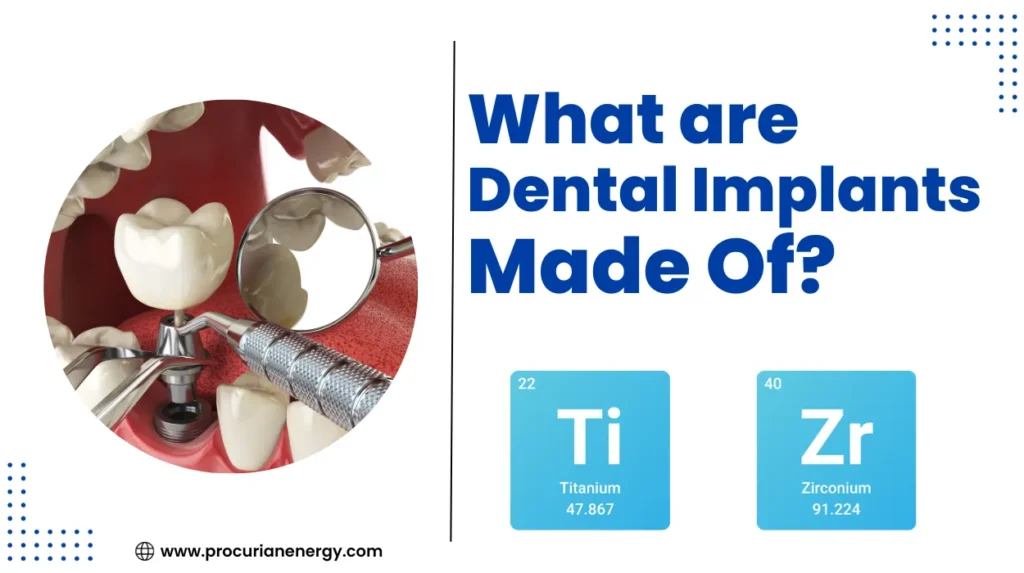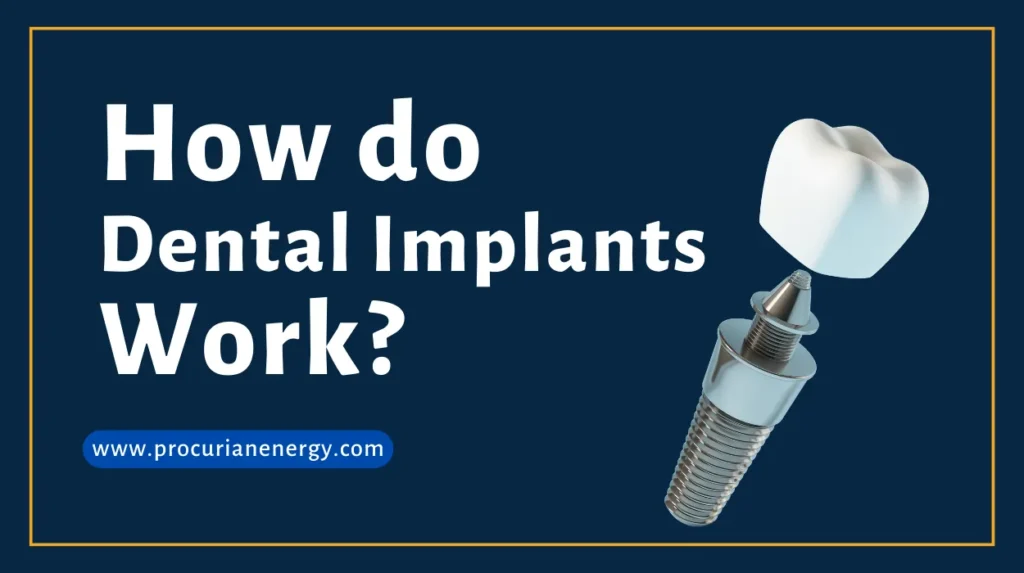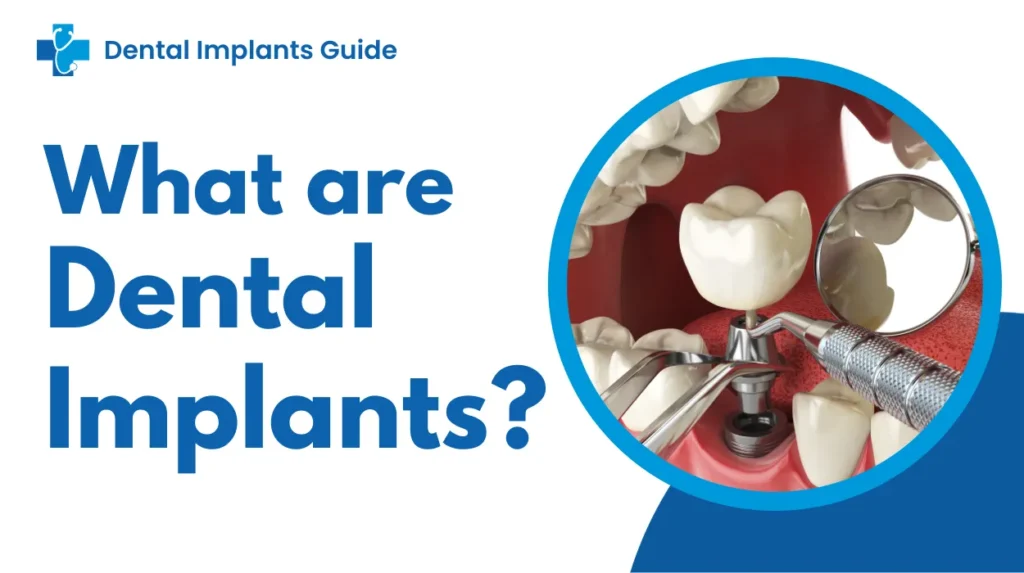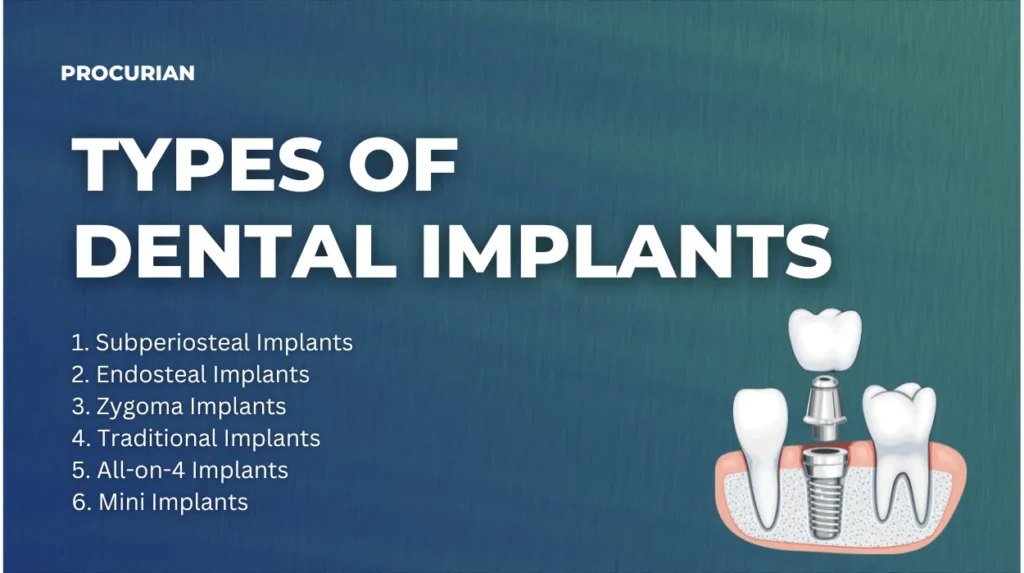
Dental implants are like magical tooth replacements that help people smile, chew, and talk comfortably again.
But do you ever wonder what are dental implants made of? This short article will describe the elements of dental implants and how they work to allow you to smile once more.
What Are Dental Implants?
Dental implants are tiny but mighty replacements for missing teeth. They are like strong roots that go into your jawbone and support new teeth that look and function just like natural ones. Dental implants can replace one tooth, several teeth, or even all of them.
There are 4 main types of Dental Implants – Endosteal Implants, Subperiosteal Implants, Mini-Dental Implants.
The Main Parts of Dental Implants
To understand what dental implants are made of, let’s break them down into their main parts:
1) Implant Fixture – This is like the root of the implant. It goes into your jawbone and acts as a sturdy anchor for your new tooth.
2) Abutment – This part connects the implant fixture to the crown, which is the visible part of the tooth.
3) Crown – The crown is the part that looks like a tooth. It’s what you see when you smile and what you use for chewing your favorite foods.
Note: If you’re not able to afford dental implant surgery, consider exploring options like dental implant grants. These programs may provide financial assistance or discounts to help cover the cost of the procedure. Even if you didn’t get approved for the grants, here are some insurance that covers Dental implants.
Materials Used for Dental Implants
Let’s now discuss the specific components that dental implants are made of. There are a few materials that are frequently used, and they all have advantages.
1) Titanium: The Superhero Material
Imagine a material so strong that it can withstand the forces of chewing and grinding day in and day out. That superhero material is titanium!
Properties of Titanium in Dental Implants
| Titanium Dental Implants | |
|---|---|
| Strength | Extremely strong and durable |
| Biocompatibility | The body rarely rejects titanium |
| Osseointegration | Bonds with the jawbone for stability |
| Longevity | Can last a lifetime with proper care |
| Appearance | Metallic |
| Allergenic | Rarely |
Titanium dental implants are the most common choice because they are tough and have been proven to work well with the human body. They’re also known for osseointegration, which means they bond with your jawbone over time, creating a super-solid foundation for your new teeth.
Advantages of Titanium Implants:
These are the most common and have a long history of success. They are strong, lightweight, and usually less expensive than other options.
Side Effects of Titanium Implants:
- Allergies – Some people might be allergic to titanium, but it’s very rare. If you have an allergy, you could have redness, swelling, or discomfort around the implant area.
- Infection – Like with any surgery, there’s a small chance of getting an infection. But if you follow your dentist’s care instructions, this risk is low.
- Discomfort – You might feel some pain or discomfort after getting a titanium implant, but it usually goes away with time and pain relievers.
Must See: Who Is NOT A Good Candidate For Dental Implants?
2) Zirconia: A Tooth-Colored Option
While titanium is the go-to option for dental implants, some people prefer a more natural-looking alternative. That’s where zirconia comes into play.
Properties of Zirconia in Dental Implants
| Zirconia Dental Implants | |
|---|---|
| Strength | Strong |
| Biocompatibility | Yes |
| Durability | Durable |
| Appearance | Natural-looking |
| Aesthetic | Tooth-colored and natural-looking |
| Hypoallergenic | Less likely to cause allergies |
Zirconia dental implants are known for their tooth-like color and hypoallergenic properties. They don’t corrode, which can be a concern with metals like titanium. However, they may not be as strong as titanium implants, so they might not be suitable for every case.
Advantages of Zirconia Implants:
These are metal-free and offer excellent aesthetics. They are biocompatible and don’t corrode, making them a great choice for those with metal sensitivities.
Side Effects of Titanium Implants:
- Fracture Risk – Zirconia implants can be more prone to breaking than titanium ones, especially if they’re not placed correctly. So, it’s super important to have a skilled dentist.
- Aesthetic Changes – Zirconia might wear down the tooth it rubs against over time. This could affect how your teeth look and work.
- Inflammation – In rare cases, zirconia can cause inflammation in the gums, which can be uncomfortable.
How Dental Implants Are Made?
Creating dental implants is a precise and detailed process. Here’s a simplified overview of how they’re made:
Step 1: Designing
First, a dental technician or a computer-aided design (CAD) system creates a detailed plan for the implant. This plan considers the size and shape of your jawbone and the specific tooth that needs replacing.
Step 2: Fabrication
Once the design is ready, the chosen material (usually titanium) is used to craft the implant fixture. It’s essential for this part to be incredibly strong to withstand the pressures of chewing.
Step 3: Surface Treatment
The surface of the implant is often treated to make it even more compatible with your jawbone. This step helps the implant fuse with the bone, a process called osseointegration.
Step 4: Adding the Abutment
After the implant fixture has been successfully integrated into the jawbone, the abutment is attached to connect the fixture to the crown.
Step 5: Crown Creation
The crown is custom-made to match the color and shape of your natural teeth. It’s carefully designed to fit seamlessly into your smile.
Step 6: Final Assembly
Finally, the crown is attached to the abutment, and your new tooth is securely in place.
Pros & Cons of Dental Implants
- Look and feel like natural teeth.
- Strong and durable.
- Can last a lifetime with proper care.
- Don’t rely on adjacent teeth for support (unlike bridges).
- Help maintain jawbone health.
- More expensive than some alternatives.
- Requires surgery, which comes with some risks.
- Not suitable for everyone (your dentist will assess your eligibility).
- Healing time can vary.
What are dental implant crowns made of?
Dental implant crowns are usually made of two main materials: Porcelain and Ceramic.
- Porcelain – This material looks a lot like your natural teeth. It’s strong and can resist stains, so your smile stays bright.
- Ceramic – This is another strong material, and it can also match the color of your other teeth. So, it blends in nicely.
Are dental implants safe for MRI?
Yes, dental implants are safe for MRI (Magnetic Resonance Imaging) scans. The materials used in dental implants, like titanium or zirconia, are not affected by the magnetic fields used in MRI machines.
Can dental implants cause bone problems?
Dental implants are designed to help, not hurt. They usually don’t cause bone problems. In fact, they can even help your jawbone stay healthy.
Here’s how it works- When you lose a tooth, your jawbone can start to shrink over time. But dental implants act like new roots and keep your jawbone strong.
However, in very rare cases, dental implants might not fuse well with the bone, which can lead to some issues.
Must See: What Can I Eat after Dental Implant Surgery?
What kind of bone is used in dental implants?
The bone used for dental implants is usually your own bone. It’s taken from somewhere in your body, like your jaw, hip, or shin. This bone is called “autograft.”
Can your mouth reject an implant?
No, your mouth doesn’t really “reject” an implant like it might with a bad food. But sometimes, your body might not like the implant. It’s pretty rare, but it can happen.
FAQs
What are dental implants made of?
Why is titanium used in dental implants?
What’s special about zirconia dental implants?
Are dental implants safe?
Do dental implants last a long time?
Do dental implants look like real teeth?
Do dental implants hurt?
Can I eat normally with dental implants?
Final words
Dental implants are made of titanium or zirconia which is an excellent solution for tooth replacement.
Implants made of titanium are strong, durable, and have a good track record. On the other hand, zirconia implants provide a more natural appearance but might not be as strong.
Which material you select will depend on your individual requirements and preferences. Your dentist or oral surgeon is the best source for advice.
Keep in mind that successful dental implants also require appropriate care and regular dental exams. Because of this, whether you select zirconia or titanium, these miniscule miracles can restore your lovely smile and chewing ability, enhancing your quality of life.









